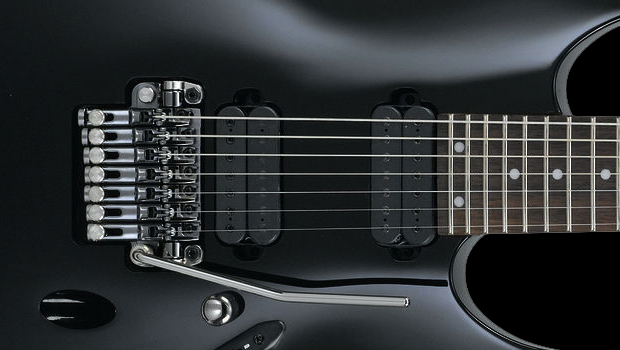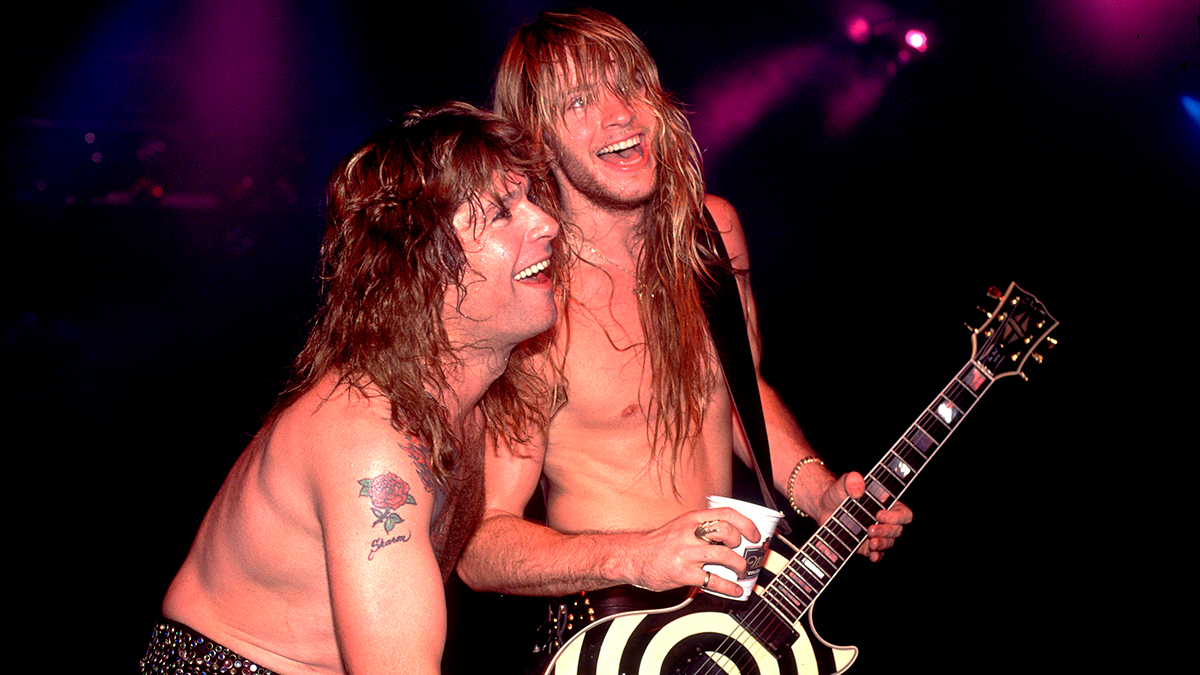Magnificent Seven: The 10 greatest seven-string guitar songs of all time

Why ain’t six strings enough? This was the question we posed to one of guitar's all-time greats in a recent Guitar World cover story.
Steve Vai, in his infinite, sage-like wisdom, responded, "Six is enough, and eight is enough too. Whatever you want. Four can be enough. One can be enough, if you’ve got the imagination for it."
And that's really what it came down to when whittling down our list of the 10 greatest seven-string guitar songs of all time. Who had the imagination to take that extra string and do something with it that couldn't be replicated simply by down-tuning or pitch-shifting?
It would have been very easy for the seven-string guitar to now be sitting in a museum somewhere as a one-off novelty item, a Spinal Tap-ish relic of someone who wanted a guitar that went "one lower." But these 10 songs are a testament to the myriad ways in which the seven-string guitar has evolved over the years, in ways that even its modern progenitor couldn't have foreseen.
"When I was [playing seven-strings], I had a feeling there was going to be a group of kids who were really gonna take that low string and do something with it that I wasn’t doing," Vai said in that same interview. "And I also felt that maybe some jazz and classical players would take it up. I had no idea that they were going to do what they did."
10. Deftones — "Hexagram" (Deftones, 2003)
Whether utilizing seven strings or eight, Deftones have packed some serious subsonics into their music over the years. "Hexagram" off the band's 2003 self-titled effort is the epitome of their haunting take on alternative metal, with Chino Moreno screaming maniacally over Stephen Carpenter's off-kilter seven-string riffing.
All the latest guitar news, interviews, lessons, reviews, deals and more, direct to your inbox!
09. Morbid Angel — "God of Emptiness" (Covenant, 1993)
Trey Azagthoth can be credited as the man who took the seven-string to the world of extreme metal, bringing in some added low-end heft for Morbid Angel's landmark 1993 album, Covenant. The result? One of the best-selling death metal albums of the SoundScan era.
08. Animals as Leaders — "CAFO" (Animals as Leaders, 2009)
When Tosin Abasi recorded what was essentially a solo album under the name Animals as Leaders, his goal was to expand the pallet of heavy, progressive music into something that was more compositionally challenging for him and more accessible to linsteners. “I wanted to make music that was more universal,” he told Guitar World in 2009. Tosin may be better known for rocking the eight-string these days, but "CAFO" from Animals as Leaders' eponymous debut is as fine an example of seven-string mastery as you'll come across in the modern metal-scape.
07. Nevermore — "Born" (The Godless Endeavor, 2005)
Few guitarists have developed such an integral bond with the seven-string guitar like former Nevermore guitarist Jeff Loomis. On the opening track from 2005's The Godless Endeavor, Loomis and fellow guitarist Steve Smyth put on a seven-string show that kicks off with a blast-beat-backed rhythmic flurry and doesn't let up for five solid minutes.
06. Emperor — "The Prophet" (Prometheus: The Discipline of Fire and Demise, 2001)
For Emperor's final album, 2001's Prometheus: The Discipline of Fire and Demise, guitarist Ihsahn began toying with the sonic and compositional possibilities of the seven-string guitar. While Ihsahn would continue down this path in his solo career (eventually deciding seven wasn't enough and opting for an eight-string guitar), Prometheus may still be his crowning achievement, representing a high-water mark for technical prowess in the black metal genre that few have approached since.
05. Joe Satriani — "Seven String" (Strange Beautiful Music, 2002)
An innovative force like few other guitarists have been, Joe Satriani has unsurprisingly turned to the seven-string guitar more than once in his career to extend the range of his alien guitar acrobatics. "A song like 'Seven String' represents the brute-force side of playing," said Satriani in a 2002 Guitar World interview, echoing just why we can't enough of this track from Strange Beautiful Music.
04. Dream Theater — "The Dark Eternal Night" (Systematic Chaos, 2007)
Dream Theater guitarist John Petrucci has made on-and-off use of the seven-string since 1994's Awake, using it to lend unique chord voicings and extended arpeggiated sequences to the band's frantic brand of prog-metal (perhaps most notably on 2002's "The Glass Prison"). But it was on the band's 2007 effort, Systematic Chaos, that Petrucci revved things up another notch entirely with the pummeling, nine-minute opus, "The Dark Eternal Night."
03. Meshuggah — "Future Breed Machine" (Destroy Erase Improve, 1995)
While you won't find any extra strings on Meshuggah's 1991 debut, Contradictions Collapse, guitarist Fredrik Thordendal knew from the very beginning that six strings just wouldn't suffice to contain the breadth of his band's music. "For as long as I can remember I’ve wanted to have a seven-string guitar so that I’d be able to play those really low notes," Thordendal told Guitar World, "and then Ibanez finally came out with one." By the time of the band's follow-up effort, the aptly named Destroy Erase Improve, the band had added an additional guitarist in Marten Hagstrom, and upped the ante with a retooled brand of progressive metal that has proven immensely influential to the new breed of metal musicians.
02. Steve Vai — "The Riddle" (Passion and Warfare, 1990)
Around the time of Whitesnake's 1989 album, Slip of the Tongue, Steve Vai was in search of some way to take the guitar into another dimension. "I was just looking for something different, looking to expand the instrument and get a different sound," said Vai in a recent interview of his part in creating the seven-string. "It wasn't a great revelation. It wasn't like the skies opened up and this instrument fell down. It was just a JEM guitar with an extra string. We tried to put a high string on it, but they kept breaking so we added a low string instead." And with that, and the release of 1990's Passion and Warfare, Vai would make his new guitar the envy of shredders worldwide.
01. Korn — "Blind" (Korn, 1994)
When grunge had the shred movement on the ropes, Korn helped to bring the seven-string back from the brink of extinction, giving rise to the nu metal movement in the process. While 1998's Follow the Leader was largely responsible for making them the unabashed leaders of the mainstream metal world with hits like "Freak on a Leash" and "Got the Life," it was the lead track off their self-titled 1994 debut that first turned heads. "I was stunned," said Steve Vai of first hearing Korn. "It sounded like a herd of buffalo wearing iron shoes and blowing fire out of their nostrils."
But the strength of Korn's sound was far from just a lumbering, low-end rumble. The guitar interplay of Munky and Head was something imitators never quite nailed down. "We feed off of each other rhythmically a lot," said Munky in a 1998 GW interview. "We play a lot of parts in unison, or I'll play a steady riff while Head plays counterpoint fills, like we do in the beginning of 'Blind.'"
The seven-string guitar is alive and well, with many of modern metal's most innovative musicians opting for (at least) one extra string to open up new creative avenues. With that in mind, here are five cuts from the last five years that are sure to garner consideration in future renditions of this list.
Periphery — "Racecar" (Periphery, 2010)
After The Burial — "My Frailty" (In Dreams, 2010)
All Shall Perish — "Awaken the Dreamers" (Awaken the Dreamers, 2008)
Scale the Summit — "Whales" (The Collective, 2011)
Textures — "Singularity" (Dualism, 2011)
![Deftones - Hexagram (Official Music Video) [HD Remaster] - YouTube](https://img.youtube.com/vi/yP4dFHSd-iw/maxresdefault.jpg)




